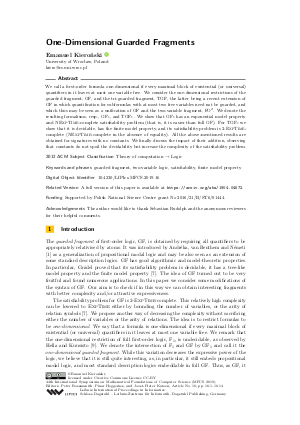One-Dimensional Guarded Fragments
Author
Emanuel Kieroński 
-
Part of:
Volume:
44th International Symposium on Mathematical Foundations of Computer Science (MFCS 2019)
Part of: Series: Leibniz International Proceedings in Informatics (LIPIcs)
Part of: Conference: Mathematical Foundations of Computer Science (MFCS) - License:
 Creative Commons Attribution 3.0 Unported license
Creative Commons Attribution 3.0 Unported license
- Publication Date: 2019-08-20
File

PDF
LIPIcs.MFCS.2019.16.pdf
- Filesize: 0.49 MB
- 14 pages
Document Identifiers
Related Versions
-
A full version of this paper is available at https://arxiv.org/abs/1904.04572.
Subject Classification
ACM Subject Classification
- Theory of computation → Logic
Keywords
- guarded fragment
- two-variable logic
- satisfiability
- finite model property
Metrics
- Access Statistics
-
Total Accesses (updated on a weekly basis)
0Document
0Metadata
Abstract
We call a first-order formula one-dimensional if every maximal block of existential (or universal) quantifiers in it leaves at most one variable free. We consider the one-dimensional restrictions of the guarded fragment, GF, and the tri-guarded fragment, TGF, the latter being a recent extension of GF in which quantification for subformulas with at most two free variables need not be guarded, and which thus may be seen as a unification of GF and the two-variable fragment, FO^2. We denote the resulting formalisms, resp., GF_1, and TGF_1. We show that GF_1 has an exponential model property and NExpTime-complete satisfiability problem (that is, it is easier than full GF). For TGF_1 we show that it is decidable, has the finite model property, and its satisfiability problem is 2-ExpTime-complete (NExpTime-complete in the absence of equality). All the above-mentioned results are obtained for signatures with no constants. We finally discuss the impact of their addition, observing that constants do not spoil the decidability but increase the complexity of the satisfiability problem.
Cite As Get BibTex
Emanuel Kieroński. One-Dimensional Guarded Fragments. In 44th International Symposium on Mathematical Foundations of Computer Science (MFCS 2019). Leibniz International Proceedings in Informatics (LIPIcs), Volume 138, pp. 16:1-16:14, Schloss Dagstuhl – Leibniz-Zentrum für Informatik (2019)
https://doi.org/10.4230/LIPIcs.MFCS.2019.16
BibTex
@InProceedings{kieronski:LIPIcs.MFCS.2019.16,
author = {Kiero\'{n}ski, Emanuel},
title = {{One-Dimensional Guarded Fragments}},
booktitle = {44th International Symposium on Mathematical Foundations of Computer Science (MFCS 2019)},
pages = {16:1--16:14},
series = {Leibniz International Proceedings in Informatics (LIPIcs)},
ISBN = {978-3-95977-117-7},
ISSN = {1868-8969},
year = {2019},
volume = {138},
editor = {Rossmanith, Peter and Heggernes, Pinar and Katoen, Joost-Pieter},
publisher = {Schloss Dagstuhl -- Leibniz-Zentrum f{\"u}r Informatik},
address = {Dagstuhl, Germany},
URL = {https://drops.dagstuhl.de/entities/document/10.4230/LIPIcs.MFCS.2019.16},
URN = {urn:nbn:de:0030-drops-109608},
doi = {10.4230/LIPIcs.MFCS.2019.16},
annote = {Keywords: guarded fragment, two-variable logic, satisfiability, finite model property}
}
Author Details
Funding
Supported by Polish National Science Centre grant No 2016/21/B/ST6/01444.
Acknowledgements
The author would like to thank Sebastian Rudolph and the anonymous reviewers for their helpful comments.
References
-
H. Andréka, J. van Benthem, and I. Németi. Modal Languages and Bounded Fragments of Predicate Logic. Journal of Philosophical Logic, 27:217-274, 1998.

-
V. Bárány, G. Gottlob, and M. Otto. Querying the Guarded Fragment. Logical Methods in Computer Science, 10(2), 2014.

-
V. Bárány, B. ten Cate, and L. Segoufin. Guarded Negation. J. ACM, 62(3):22, 2015.

-
P. Bourhis, M. Morak, and A. Pieris. Making Cross Products and Guarded Ontology Languages Compatible. In International Joint Conference on Artificial Intelligence, IJCAI 2017, pages 880-886, 2017.

- A. K. Chandra, D. Kozen, and L. J. Stockmeyer. Alternation. J. ACM, 28(1):114-133, 1981. URL: https://doi.org/10.1145/322234.322243.
-
W. D. Goldfarb. The unsolvability of the Gödel class with identity. J. Symb. Logic, 49:1237-1252, 1984.

-
E. Grädel. On The Restraining Power of Guards. J. Symb. Log., 64(4):1719-1742, 1999.

-
E. Grädel, P. Kolaitis, and M. Y. Vardi. On the decision problem for two-variable first-order logic. Bulletin of Symbolic Logic, 3(1):53-69, 1997.

-
L. Hella and A. Kuusisto. One-dimensional Fragment of First-order Logic. In Proceedings of Advances in Modal Logic, 2014, pages 274-293, 2014.

-
A.S. Kahr, E.F. Moore, and H. Wang. Entscheidungsproblem reduced to the ∀ ∃ ∀ case. Proc. Nat. Acad. Sci. U.S.A., 48:365-377, 1962.

-
Y. Kazakov. Saturation-based decision procedures for extensions of the guarded fragment. PhD thesis, Universität des Saarlandes, Saarbrücken, Germany, 2006.

-
E. Kieroński. Results on the Guarded Fragment with Equivalence or Transitive Relations. In Computer Science Logic, volume 3634 of LNCS, pages 309-324. Springer, 2005.

-
E. Kieronski and A. Kuusisto. Complexity and Expressivity of Uniform One-Dimensional Fragment with Equality. In MFCS. Proceedings, Part I, pages 365-376, 2014.

-
M. Mortimer. On languages with two variables. Zeitschrift für Mathematische Logik und Grundlagen der Mathematik, 21:135-140, 1975.

-
Sebastian Rudolph and Mantas Šimkus. The Triguarded Fragment of First-Order Logic. In LPAR-22. 22nd International Conference on Logic for Programming, Artificial Intelligence and Reasoning, volume 57 of EPiC Series in Computing, pages 604-619, 2018.

-
B. ten Cate and L. Segoufin. Unary negation. Logical Methods in Comp. Sc., 9(3), 2013.

-
J. van Benthem. Dynamic bits and pieces. ILLC Research Report, 1997.

